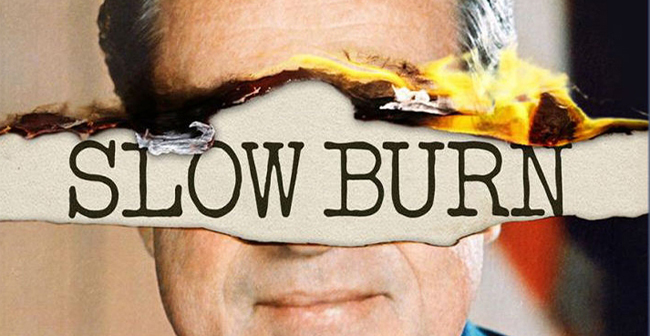Culture
 Photo: Courtesy of Slate
Photo: Courtesy of Slate
Dick Cavett Takes the Cake at The Watergate
February 9, 2018 @ 12:00am
Slow Burn begins with a story that you’ve likely never heard, according to show host Leon Neyfakh. A few days after the Watergate break-in in 1972, Martha Mitchell was held as a prisoner for several days by Nixon acolytes for knowing too much.
When she did share her story, she was dismissed as deranged, and it wasn’t until years later that she was vindicated. Thus we now have the “Martha Mitchell Effect” – the process by which a mental health clinician labels a patient’s accurate perception of real events as delusional.
Slow Burn is a podcast about Watergate produced by Slate, and on it, Neyfakh shares this and other such stories. The show gives a sense of what it was like to live through Watergate – not knowing that it would lead to Nixon’s disgraceful resignation.
To that end, Neyfakh talks with those who experienced it firsthand, and incorporates some of these interviews into the show. This has included his interview with comedian and eponymous talk show host Dick Cavett.
“I must say, I miss it terribly,” Cavett said.
He compared the Watergate era to a trip you might get to take to Paris when you’re young that you’ll never get to relive.
“You can never get back to that wonderful feeling.”
On February 8, Cavett joined Neyfakh at The Watergate Hotel itself for a live taping of the podcast, during which they had an open conversation about that wonderful and often scary feeling.
The two were joined by Susan Glasser of Politico, Elizabeth Drew, who reported on Watergate at the time for the New York Times, and Evan Thomas, the author of the Nixon biography Being Nixon: A Man Divided. Of course, in the case of Neyfakh and Glasser, what it was like to live through Watergate was more of a speculative question.
Each had their salient points and insights to share; however, Cavett’s stories and one liners tended to steal the show. Cavett, on his show, was one of the first people to begin talking about Watergate, and Nixon came to despise him for it.
Nixon’s malice toward Cavett even comes out on the White House tapes, and Cavett said that now whenever he’s feeling down, he goes and listens to that snippet of Nixon asking, “How can we screw him?”
Cavett also shared contemporaneous jokes.
“Nixon was the kind of guy that if you fell overboard and were 20 feet from shore, he would throw you a 15 foot line. And [Henry] Kissinger [Nixon’s Secretary of State] would announce that Nixon had met you more than halfway.”
On the show, Neyfakh, excluding one or two asides, steered the conversation away from parallels to life under Trump; however, at the Watergate, the panel openly discussed the extent to which Nixon and Trump could be compared.
Slate certainly knew their audience, for the turn in discussion was well met by the crowd. Neyfakh also described a sense of relief in being able to talk about it openly. I think on both sides, it felt like getting to the heart of the matter.
But some of the comparisons drawn were more superficial (e.g., the contrast between Nixon’s reading habits and those of Trump). Nixon read whole libraries whereas Trump, as Cavett puts it in a tweet:
“A: Imagine Donald Trump’s library.”
“B: You’d have to.”
Cavett also didn’t miss a beat when Glasser began to discuss the contrast between the linear progression that was Watergate and the upside down world of life under Trump.
“Trump came in like an asteroid,” Glasser said.
“I’m sorry, what kind of an ass?” Cavett asked.
“I’ll play your straight man,” Glasser responded.
Perhaps some of the strongest points had to do with the extent to which Nixon and Trump are both insular, and those who have their ear might stand even further outside the norm.
The emphasis on what it was like to live through Watergate felt germane as well. I was able to speak with Neyfakh over the phone several days before the event, and he said much the same.
“The extreme tension and frankly despair for the country paired with a sense of curiosity, of amusement, the fact that those two things could coexist and be felt in equal measure – I think that’s something that people today can identify with.”
In our conversation, Neyfakh also described the impetus for making the show.
“We were all overwhelmed with the news and with the feeling that we were living in objectively precarious times – when you feel like you can wake up and not know what’s going to happen or what the alert on your phone is going to say. And so Watergate is the last time the country went through this on this scale. So we thought that going back and capturing that experience would give us some perspective on our own experience, and I think that’s panned out.”
When I asked him what the most surprising thing he encountered in his research was, he had two answers. The first of these I’ll leave for the end, but the second had to do with another point emphasized at the live show: Watergate never necessarily had to become Watergate.
“I think the bigger thing I had no appreciation for was how long it took. I knew the dates, but I didn’t have an appreciation for how many steps there were along the way, and how many forks in the road there were in which the country went one way and it could have gone another. And to realize that this story did not have a foregone conclusion, that it was never inevitable that Nixon would have to resign under pressure with the threat of certain impeachment looming over him if he didn’t.”
The other surprise Neyfakh left me to chew on was Nixon’s breakfast of choice: cottage cheese and ketchup. Yuck. Add some aspic next time, Dick.
You can listen to Slow Burn on iTunes, Spotify or wherever you get your podcasts. And keep an eye open for season two; Neyfakh revealed at the live event that it will follow the impeachment of Bill Clinton.







